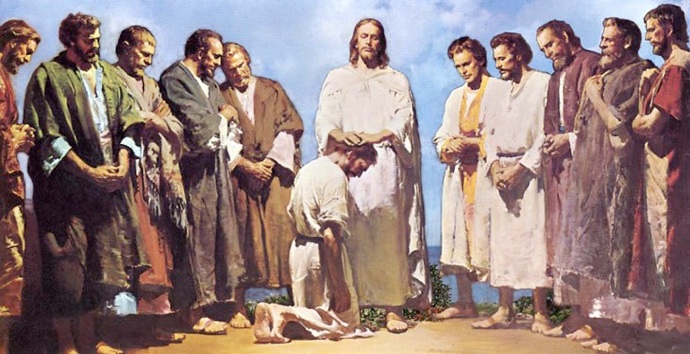29th Sunday in Ordinary Time
– World Mission Sunday –
– Reach out and Spread the joy –
The Gospel selected for today is taken is taken from Jesus’ discourse at the Last Supper about the spreading of the Gospel message. Jesus prays that as the Father has sent him into the world, now he sends his disciples. He prays that they may be consecrated in truth and prays, ‘With me in them and they in me, may they be completely one that the world may realise that it was you who sent me and that I have loved them as much as you loved me.’
FIRST READING
A reading from the book of Isaiah 45:1. 4-6
I have taken Cyrus, by his right hand to subdue nations before him.

Thus says the Lord to his anointed, to Cyrus, whom he has taken by his right hand
to subdue nations before him and strip the loins of kings,
to force gateways before him that their gates be closed no more:
It is for the sake of my servant Jacob, of Israel my chosen one,
that I have called you by your name,
conferring a title though you do not know me.
I am the Lord, unrivalled; there is no other God besides me.
Though you do not know me, I arm you that men may know
from the rising to the setting of the sun that, apart from me, all is nothing.
The Word of the Lord. Thanks be to God.
Responsorial Psalm Ps 95
Response Give the Lord glory and power.
l. O sing a new song to the Lord, sing to the Lord all the earth.
Tell among the nations his glory and his wonders among all the peoples. Response

2. The Lord is great and worthy of praise, to be feared above all gods;
the gods of the heathens are naught. It was the Lord who made the heavens. Response
3. Give the Lord, you families of peoples, give the Lord glory and power,
give the Lord the glory of his name. Bring an offering and enter his courts. Response
4. Worship the Lord in his temple. O earth, tremble before him.
Proclaim to the nations: ‘God is king.’ He will judge the peoples in fairness. Response
SECOND READING
A reading from the first letter of St Paul to theThessalonians 1:1-5
We constantly remember your faith in action, your love and your hope.

From Paul, Silvanus and Timothy, to the Church in Thessalonika which is in God the Father and the Lord Jesus Christ; wishing you grace and peace.
We always mention you in our prayers and thank God for you all, and constantly remember before God our Father how you have shown your faith in action, worked for love and persevered through hope, in our Lord Jesus Christ.
We know, brothers, that God loves you and that you have been chosen, because when we brought the Good News to you, it came to you not only as words, but as power and as the Holy Spirit and as utter conviction.
The Word of the Lord. Thanks be to God.
Gospel Acclamation Jn 17: 17
Alleluia, Alleluia!
Your word is truth, O Lord, consecrate us in the truth.
Alleluia!
Or Phil 2: 15-16
Alleluia, Alleluia!
You will shine in the world like bright stars because you are offering it the word of life.
Alleluia!
GOSPEL
A reading from the holy Gospel according to Matthew 22:15-21
Give back to Caesar what belongs to Caesar – and to God what belongs to God.

The Pharisees went away to work out between them how to trap Jesus in what he said. And they sent their disciples to him, together with the Herodians, to say,
‘Master, we know that you are an honest man and teach the way of God in an honest way, and that you are not afraid of anyone, because a man’s rank means nothing to you. Tell us your opinion, then. Is it permissible to pay taxes to Caesar or not?
But Jesus was aware of their malice and replied,
‘You hypocrites! Why do you set this trap for me?
Let me see the money you pay the tax with.’
They handed him a denarius and he said, ‘Whose head is this? Whose name?’
‘Caesar’s’ they replied.
He then said to them, ‘Very well, give back to Caesar what belongs to Caesar – and to God what belongs to God.’
The Gospel of the Lord. Praise to you, Lord Jesus Christ.
Gospel Reflection
Today’s passage is built around the saying in verse 21, “Give back to Caesar what belongs to Caesar and to God what belongs to God”. It is a “wisdom saying” and the passage invites us to enter into it with our feelings. Its truth should touch us so deeply that we are filled with gratitude, and also with humility as we realise that do we do not live up to it – as individuals, as a Church and as communities. The saying then becomes a call to repentance.
In order to bring the saying alive in this way, we need to read it in the context of a story, which is how it is presented to us, not as an abstract timeless truth but as a response to a situation. The question for us then is, when did we experience a similar situation? And then, who was the Jesus who spoke as he did?
We must be careful to interpret the saying correctly. In the course of the Church’s history, it has often been taken to mean that there are areas of life which are Caesar’s domain and other areas which are God’s.
In fact the saying has been used to justify the claim that religious leaders should not “interfere” in secular fields like politics, economics or culture.
This could not possibly be the meaning, however. The entire teaching of Jesus, indeed the entire bible, insists that the whole of creation “belongs to God” – “his is the earth and the fullness thereof”. There is no question of “separate domains” therefore, since everything belongs to God.

The saying is rather about keeping priorities right. The Pharisees voice a concern which seems at first sight to be harmless but is in fact a “trap”. They are not neutral. For them, paying taxes to Caesar is important, whereas for Jesus (as for all people whose priorities are right) it is only of relative importance: he says in effect, “you can give back to Caesar whatever belongs to him (whatever has his head engraved on it); just make sure you don’t give him what belongs to God”.

“What belongs to God” must be taken in a wide sense to mean what is so precious that we cannot make concessions where it is concerned – family, friendship, the sanctity of sex, self respect, compassion,humility, care for the poor, etc.
Jesus then is challenging the Pharisees to get their priorities right.
– His position can be expressed positively: treasure what is primary for you, and you will find that you will have no problem looking after (“paying your taxes” to) what is secondary.
– It can also be expressed negatively: don’t take secondary things so seriously (“pay taxes to them”) that you end up compromising what is primary.
We enter into the drama of “whose head is this?” Feel Jesus’ inner freedom (a hint of disdain) when he says, “well then, give it back to him”. On the other hand feel the terrible sadness of a priority gone wrong
– allowing something that is sacred (“belongs to God”), to have “Caesar’s head” engraved on it.
The passage is intended to evoke memories of people or communities getting priorities wrong:
– parents who provide material benefits for their children but neglect to give them quality time.
– teachers who stress success in examinations and forget to praise those who are not successful but do their best.
– Church leaders who are more concerned with what people think than with being faithful to the message of Jesus.
– public officials who work for popularity and compromise their integrity.
Jesus is the person (or community) pointing out that priorities have gone wrong. As with all insightful statements, his answer is simple but surprising (“it took them by surprise”) and deeply satisfying (“they left him alone and went away”).
A sign that we have made a good meditation is that we identify with the Pharisees. If we find ourselves looking down on them, it means that we haven’t really entered into the story. They represent us (sometimes an inner voice within us) when we voice concerns which are important but which are really “a trap” in which more important values are lost. This situation occurs in:
– our personal lives, e.g. concerns with health, job security, standing in the community;
– the life of the Church, e.g. concerns for large numbers, prestige, structures;
– the development of a social movement, e.g. concern with taking political power, finances.
The details of how the Pharisees “went about” asking their question are all significant and can help us recognise them from our experience.
– They “set traps”: their concern hampers true growth.
– They “work it out”: their arguments are very subtle; note in particular the unctuous language; we are never more “pious” than when we are rationalizing our fears and prejudices.
– They do it “between them”: what they say represents the thinking of many, an entire class or even a culture.
The Pharisees’ flattery in verse 16 is part of their “trap”, but we can take their words at face value. They were right to say that Jesus was “an honest man” who “taught the way of God in an honest way,” that he was “not afraid of any one” and that people’s rank “meant nothing to him”. We celebrate people (or communities) like that; we read these words as a call to repentance.
************************************************************
an occasionally used GOSPEL (For Mission Sunday)
The Lord be with you And with your spirit.
A reading from the Gospel according to John 17:11, 17-23 Glory to you, O Lord
With me in them and they in me, may they be completely one that the world may realise that it was you who sent me and that I have loved them as much as you loved me.’
Jesus raised his his eyes to heaven and said:

I am no longer in the world, but they are in the world and I am coming to you.
Consecrate them in the truth your word is truth.
As you sent me into the world I have sent them into the world
and for their sake I consecrate myself
so that they too may be consecrated in truth:
I pray not only for those but also for those
who through their teaching will come to believe in me.
May they all be one, just as, Father, you are in me and I in you
so that they also may be in us,
so that the world may believe it was you who sent me.
I have given them the glory you gave to me, that they may be one as we are one.
With me in them and you in me, may they be so perfected in unity that the world w ill recognise that it was you who sent me
and that you have loved them as you loved me.
The Gospel of the Lord Praise to you, Lord Jesus Christ.







![#KingdompadiMusicVid: James Akinwumi | Our God [@MinisterjamesOF]](https://www.kingdompadi.com/wp-content/uploads/2025/03/WhatsApp-Image-2025-03-03-at-15.05.04_acb15277-150x150.jpg)





